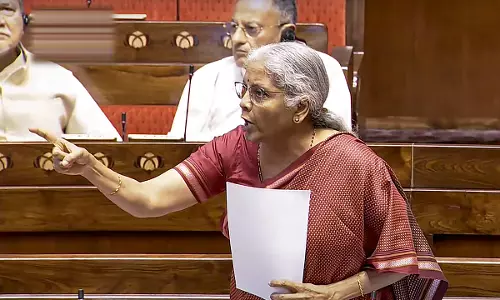IMF flags major systemic risk with NBFCs with exposure to power sector
RBI had a few months back voiced concern over the growing exposure of banks to NBFCs. According to the RBI, exposures of the top 50 government-owned NBFCs, totalling Rs7.8 lakh crore accounted for 40 per cent of the total corporate credit in the NBFC sector during FY2023, all linked to the power industry;

Chennai: The IMF has flagged major systemic risk with NBFCs in India. Their concentrated exposures, especially to the power sector, could trigger systemic issues through their linkages with banks, corporate bond markets, and mutual funds, it said.
Despite reforms, the power sector continues to show structural vulnerabilities, compounded by transition risks from climate change. While banks reduced their direct exposures to the sector, NBFCs— particularly large state-owned infrastructure financing companies—have significantly increased theirs. If major NBFCs were to become distressed, the shock could spill over to banks, corporate bond markets, and mutual funds, IMF said in a report.
State-owned Rural Electrification Corporation Limited (REC), Power Finance Corporation (PFC) and the Indian Renewable Energy Development Agency Limited (IREDA) are the leading NBFCs which have provided finance commitments of Rs 14 lakh crore to the power sector. As of March 2023, Indian state-sector discoms had accumulated Rs 6.76 lakh crore worth of losses and Rs 6.61 lakh crore worth of debt.
RBI had a few months back voiced concern over the growing exposure of banks to NBFCs. According to the RBI, exposures of the top 50 government-owned NBFCs, totalling Rs7.8 lakh crore accounted for 40 per cent of the total corporate credit in the NBFC sector during FY2023, all linked to the power industry.
This significant concentration introduces risks, as a downturn in the power sector or challenges faced by a few large NBFCs could have a ripple effect throughout the sector. Their exposure extends beyond loans to include investments in debentures and commercial papers issued by these firms, thus, heightening contagion risk.
Without naming the NBFCs, the IMF said that additional regulatory measures are essential. “The regulations of state-owned NBFCs should be aligned with those of the private sector, especially given that state-owned NBFCs are currently exempt from large exposure limits. Data and tools for systemwide and contagion risk analysis should be enhanced, and broader macroprudential policy could be implemented. The central bank should be ready to expand crisis-time liquidity policy options to include tools more suited for systemic liquidity events among NBFIs and markets,” it said.
Further, IRDAI should also be given legal powers for starting group supervision. Moreover, finalizing and enacting the resolution legislation aligned with international standards is essential for establishing a comprehensive resolution regime, IMF said.


